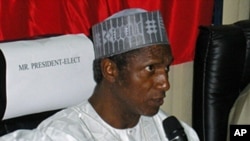Pressure is mounting on ailing Nigerian President Umaru Yar'Adua to hand over power or quickly return to Nigeria from Saudi Arabia, where he has been getting medical care for more than two months. The uncertainty about Nigeria's leadership comes as violence has reignited in the oil-rich south, and as the leader of al-Qaida in the Islamic Maghreb offered training and weapons to Nigerian Muslims.
J. Peter Pham, the director of the Africa project at the U.S. based National Committee on American Foreign Policy, recently wrote an online article called "The Sick Man of Africa."
Writing in the "National Interest," Pham says Nigeria's leadership vacuum comes at the wrong time, especially in the wake of the failed December 25th U.S. airline bombing for which a young Nigerian was charged.
"If Nigeria is going to be a partner with the United States and other countries in fighting extremism and these types of things, it needs leadership at the top and whenever there is not firm direction all sorts of interests creep out," said Pham.
Monday, compounding these concerns, the leader of al-Qaida's North Africa branch posted a statement on the Internet saying he was ready to help Muslims in central Nigeria. The statement comes amid renewed sectarian and religious violence which has left hundreds of people dead in recent weeks.
Meanwhile, in the oil-rich south, there was a sabotage attack Saturday against oil pipelines. The attack follows months of relative calm. Militants recently called off a unilateral ceasefire with government forces, saying Mr. Yar'Adua's administration is not honoring promises to help local communities.
President Yar'Adua went to a hospital in Saudi Arabia in late November, with reported heart and kidney problems, and has not been seen in public since. In mid-January, the 58-year-old Yar'Adua, who was previously a discreet governor from the northern Katsina state, said he was doing better.
The ruling party said in late January he had been released from a hospital in Saudi Arabia, but he has yet to return to Nigeria.
J. Peter Pham says he is very concerned about the potential for more instability in the oil-rich south during his continued absence.
"Certainly, renewed violence in the Niger Delta would cut Nigeria's oil production which affects the global economy at a time when we do not need any further shocks in the global economy.," he said. "[Nigeria's] production has been cut by as much as a third during periods of peak violence."
Pham also says with Mr. Yar'Adua failing to delegate power to someone else while outside Nigeria, Africa's most populous nation has been missed as a regional heavyweight.
"We have increasing piracy underreported in the Gulf of Guinea that requires serious committed action, but Nigeria which is the regional power is not able to act because there is no political leadership at the top," said Pham.
Pham also says Nigeria has not been able to help much with the instability in Guinea, following an attack on the military ruler there.
There have been several attempts through Nigeria's judicial system to make Mr. Yar'Adua give up power, but Nigerian courts have repeatedly ruled he does not need to formally transfer power to his Vice President, Goodluck Jonathan. More appeals are being considered.
There have also been protests for Mr. Yar'Adua to step down, as well as a letter from a group calling itself the Eminent Elders which asked the vice president to be named acting president.
Political science professor at the City University of New York, Nigerian-American Mojubaolu Olufunke Okome, has been encouraged by attempts to make the leadership issue more transparent, and in line with Nigeria's constitution.
"I do not think Nigeria is leaderless," said Mojubaolu Olufunke Okome. "I think there is a constitutional issue and I am glad that people are trying to pursue this in the constitutional manner. In terms of the practice of democracy, I think it will be advised for Nigerian politicians to be more attentive to the provisions of the constitution and to also demonstrate through their actions that they are committed to democracy and the proper practice of it."
One concern has been the assumed traditional rotation between northerners and southerners in Nigeria's highest office since the return to civilian rule in the 1990s. The vice-president is a southerner, but Pham does not see this an obstacle. He says he could appoint a northerner as vice president until general elections are held, scheduled for 2011, which he says are also of concern.
"We need to be supportive and reaffirm Nigeria's need to get on with its business and the fact that it is missed on the international stage and that Nigeria needs to seriously work, beginning now on the election,' he said. "Last time, I think everyone acknowledges that President Yar'Adua was elected in elections which fraudulent probably does not begin to describe the level of voter intimidation, corruption and other things that occurred during that election."
Goodluck Jonathan who was the ruling party's surprise selection as Mr. Yar'Adua's running mate in the 2007 vote, said last week his boss would soon return to Nigeria. But he did not give a date.
Threats, Violence Compound Nigeria's Leadership Crisis




